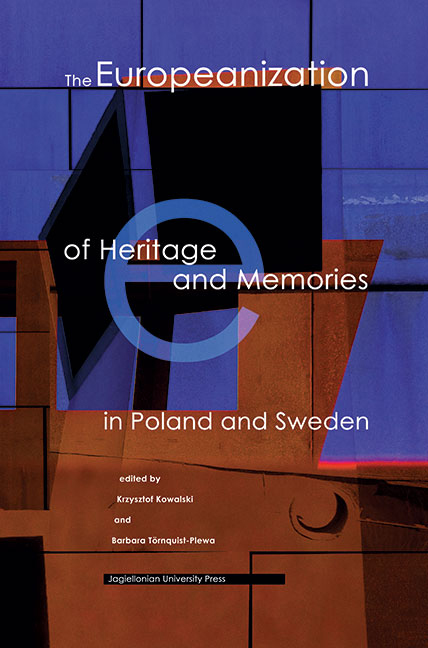Book contents
- Frontmatter
- Contents
- Acknowledgements
- Preface
- PART I European Heritage in the Making
- Heritage and Memory in a Changing Europe. Introductory Remarks
- Democratization as an Aspect of Heritage Europeanization. The Museum Triangle
- “A Dangerous Country.” The Council of Europe in Search of a Common Heritage
- Eurovikings. European Heritage Discourses and Transnational Practices in a Viking Site
- Euro-ethics. European Solidarity Centre in Gdańsk and the Narrative on the Polish Road to Freedom
- PART II Redefining the Dramatic Past
- Conclusion
- Notes on Contributors
Heritage and Memory in a Changing Europe. Introductory Remarks
from PART I - European Heritage in the Making
Published online by Cambridge University Press: 22 December 2017
- Frontmatter
- Contents
- Acknowledgements
- Preface
- PART I European Heritage in the Making
- Heritage and Memory in a Changing Europe. Introductory Remarks
- Democratization as an Aspect of Heritage Europeanization. The Museum Triangle
- “A Dangerous Country.” The Council of Europe in Search of a Common Heritage
- Eurovikings. European Heritage Discourses and Transnational Practices in a Viking Site
- Euro-ethics. European Solidarity Centre in Gdańsk and the Narrative on the Polish Road to Freedom
- PART II Redefining the Dramatic Past
- Conclusion
- Notes on Contributors
Summary
At the dawn of the 21st century, European societies differ internally and are characterized by a pluralism expressed by the presence of complementary or alternative heritages and memories. This abundance stems from the different manners of utilizing the traces of the past and the fact that the process of constructing an account of the past leads to the meeting of what is public with that which is private, with the official and the unofficial, the local and what is legitimized on the national and European levels. Furthermore, in the enduring multicultural societies of the Old Continent, the past is experienced very differently and, as a result, varied and often conflicting accounts exist of memory and heritage.
The complexity of contemporary Europe has given birth to a tension between the diversity of representations of the past and the need for European unity and in this context the role of European heritage cannot be underestimated. It is either presented as a monolithic entity based on clearly defined values which are regarded as European or as a cosmopolitan constellation of heterogeneous forms of tackling the past which coexist on the local, regional, transnational, national and European levels. The compromise is an effect of the redefinition of the past which cannot be studied in isolation from European integration, which accelerates and decelerates by turns, undergoing crises and overcoming them. Failure to agree that the motto “Unity in diversity” also applies to the different interpretations of the past will only strengthen and hasten the disintegration of the Old Continent.
In order to capture the multidimensional and diverse manner of processes which affect the reinterpretation of heritage and memory in today's Europe, the contributors to this volume agree upon the usefulness of notions such as memory, heritage and Europeanization. Thus, in the following section we would like to briefly explain how we understand and define these well established, but still disputable terms.
Memory
There are an abundance of definitions and theoretical discussions about socially shared memories, beginning with such classics as Maurice Halbwachs and Pierre Nora and ending with writings by more recent scholars, for example Aleida Assman or Astrid Erll.
- Type
- Chapter
- Information
- Publisher: Jagiellonian University PressPrint publication year: 2016



